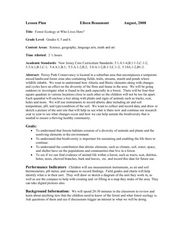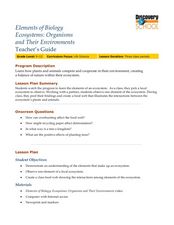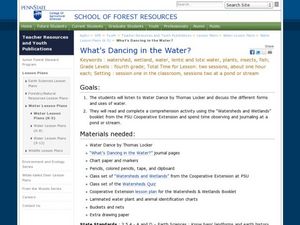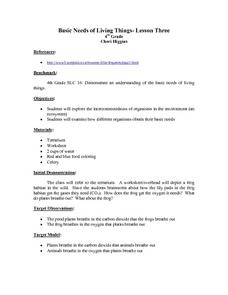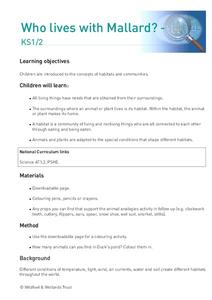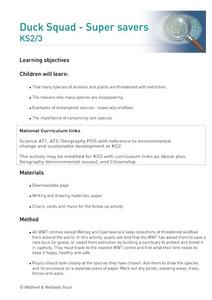Curated OER
Who Lives with Mallard?
Young scholars color a picture of the habitat featuring mallard and other creatures, some of whom might be camouflaged or half-hidden. They discuss other forms of animal adaptation.
Curated OER
Animal Habitat Dioramas
What a better way to have learners show what they know than with a diorama? Kids research an animal, its habitat, ecosystem, and environment in order to create a three-dimensional diorama. Have older children write a short paper on their...
Curated OER
The right place to live
How do various plants survive in different environments? They adapt! Kids determine which plant traits make them perfect for their specific environment. They consider three plants and can even complete a plant experiment. Note: Intended...
Curated OER
Water Wonders
Students explore hydrology concepts. In this environment and biology instructional activity, students identify and describe macroinvertebrates using a variety of pictures and resources. Students observe and write about a classroom...
Curated OER
Sorting Pond
Students practice balancing while learning the classifications of different animals
Curated OER
Beaver Succession Mural
Students explore the concept of beaver pond succession. In this succession lesson, students discuss what succession is and how it works. Students create a mural to present their understanding of this concept.
Curated OER
Forest Ecology or Who Lives Here?
Students explore a hardwood forest. In this forest ecology lesson, students examine the diversity and animals and plants as they explore their habitats at Poricy Park Conservatory. Students determine how biodiversity and abiotic elements...
Curated OER
Wetlands Ecosytem Study Unit
In this wetlands ecosystem worksheet, students use a set of links to complete an investigation into habitats, mammals, birds, macroinvertebrates, amphibians, trees and plants of a wetlands ecosystem.
Curated OER
Models of Succession
Students create a model city in order to understand the effects human habitats have on the environment. In this environment lesson, students examine the effects human habitats have on the environment. Students create a model city and...
Curated OER
Aquatic Habitat Water Quality Experiment
Fifth graders discuss the importance of water quality for humans and fish and make predictions about what happens to water that is polluted. In small groups, they conduct experiments to compare and contrast water that is unpolluted and...
Curated OER
Organisms and Their Environments
Young scholars study a local ecosystem and research the organisms to create a food web. In this ecosystem lesson, students view a video and answer questions. They visit a local ecosystem and make a list of organisms to research. Young...
Curated OER
What's Dancing in the Water?
Students learn about watershed, as well as the different forms and uses of water. In this water forms lesson, students brainstorm water sources and uses. Students read the book Water Dance and discuss water examples. Students complete a...
Curated OER
Frogs: Fact or Folklore
Students discover how frogs are adapted to their environment. They view and discuss a Discovery Channel video on frogs and the myths surrounding frogs. In small, groups they compile data on frogs from the internet to create a Frog Fact...
Curated OER
Basic Needs of Living Things-Lesson Three
Fourth graders explore the interconnectedness of organisms in the environment and examine how different organisms obtain their basic needs. They discuss a frog's habitat and what is found in it. Students discuss the processes of...
Curated OER
Habitat Mural
Students build a collage of an ecosystem. The goal is for them to understand interactions in a community, plant and animal adaptations, and how all life depends on plants. This activity is based on Wump World and students describe what...
Curated OER
Who lives with Mallard?
Young scholars explore how all living things have needs that are obtained from their surroundings. They identify the surroundings where an animal or plant lives is its habitat. Students identify that a habitat is a community of living...
Curated OER
Graphing Water Temperature
Learners graph water temperature using probe software and a Palm on a class field trip to a lake or pond. Emphasis is placed on collaboration with high school science students and the use of ImagiProbe software.
Curated OER
Birding Basics
Fourth graders understand the bird identification by sight and sound. In groups of 3-4, they use binoculars, field guide, checklist, and pencil and hike around the pond and through the woods, pointing out birds along the way.
Curated OER
Investigating Animals in Water
Students observe small animal activity. They identify local water animals and describe the habitats where water animals can be found. Students collect samples to observe in the classroom.
Curated OER
Froggy Fun
Students exploring about frogs and their environment. They describe what camouflage is and why it is useful to frogs especially in the environment that frogs live in. They also draw a picture of a frog in its habitat.
Curated OER
Sarita Wetland Restoration
Students collaborate on the plannng and implementation of the Sarita Wetland Restoration. The Sarita Wetland is the remnant of former Lake Sarita that was drained in the early 1900's. The goal of the entire project is to improve water...
Curated OER
Writing Process- Expository Writing
Expository writing is the focus of the language arts lesson presented here. In it, young writers review what expository writing is through a class discussion and teacher demonstration. Then, learners write expository text that describes...
Cornell University
Beneficial Insects
A lot of people think of insects as pests. But actually, some insects are beneficial because they get rid of pests! After learning about beneficial insects, class members research given insects to find out if they are pests or predators.
Curated OER
Duck Squad-Super Savers
Students "save" a rare duck (or goose, or swan) from extinction by "building" a sanctuary to protect and breed it in captivity. They research what the bird needs and draw the species and its enclosure.








